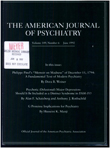Brain neurotransmitter changes in three patients who had a fatal hyperthermia syndrome
Abstract
The authors examined the autopsied brains from three patients who had a fatal hyperthermia syndrome. There was marked hypothalamic noradrenaline depletion in all three patients, severe brain choline acetyltransferase deficiency with nucleus basalis cell loss in two patients, and mild to moderate brain choline acetyltransferase loss in one patient. Striatal dopamine metabolite/dopamine ratio was below normal in two patients and not elevated, as would be expected after short-term neuroleptic administration, in the third. This suggests that reduced capability (aggravated by the cholinergic deficit) of the nigrostriatal dopamine system to respond adequately to stress and/or neuroleptic-induced receptor blockade may be important in the development and course of fatal hyperthermia syndrome.
Access content
To read the fulltext, please use one of the options below to sign in or purchase access.- Personal login
- Institutional Login
- Sign in via OpenAthens
- Register for access
-
Please login/register if you wish to pair your device and check access availability.
Not a subscriber?
PsychiatryOnline subscription options offer access to the DSM-5 library, books, journals, CME, and patient resources. This all-in-one virtual library provides psychiatrists and mental health professionals with key resources for diagnosis, treatment, research, and professional development.
Need more help? PsychiatryOnline Customer Service may be reached by emailing [email protected] or by calling 800-368-5777 (in the U.S.) or 703-907-7322 (outside the U.S.).



